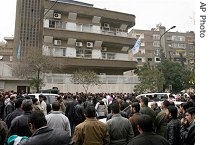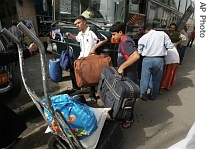2007年VOA标准英语-UN Says More Than Four Million Iraqis Have Fled
搜索关注在线英语听力室公众号:tingroom,领取免费英语资料大礼包。
(单词翻译)
By Meredith BuelWashington
06 July 2007
The United Nations estimates there are now more than four million Iraqis who are either internally displaced or have fled the violence in their homeland to become refugees, mostly in neighboring states. Middle East analysts2 say the crisis is continuing to grow and is straining services in Syria and Jordan, where most of the refugees now live. VOA correspondent Meredith Buel has details in this background report from Washington.
The United Nations says the magnitude of the crisis is staggering. More than two million Iraqis are believed to be displaced inside the country, and another 2.2 million are refugees in other nations.
 |
| Thousands of Iraqi refugees gather outside the offices of a U.N. refugee agency in Damascus, Syria, to register their names for obtaining a refugee status, Feb 2007 |
The president of the Middle East Institute, Wendy Chamberlin, who is a former U.N. deputy high commissioner4 for refugees, says displaced Iraqis are overwhelming services in neighboring countries.
"There is a large population of Iraqis in Amman seeking refuge from the violence in their own country and it has an impact on the economy and the services of this small kingdom," said Chamberlin. "Likewise, in Syria, the influx5 of Iraqis has strained social services, hospitals, schools, etcetera."
The U.N. says the current exodus6 of Iraqis is the largest long-term population movement in the Middle East since the displacement7 of Palestinians following the creation of Israel in 1948.
Middle East analyst1 Nir Rosen, a fellow at the New America Foundation, says the millions of displaced Iraqis are likely to further destabilize the region.
"You will hear Iraqis say we are being treated like Palestinians," said Rosen. "We are the new Palestinians. I believe in years to come we will see them too becoming more organized, mobilized and indeed militarized and I think the Iraq conflict will become the Middle East conflict quite soon."
Most of the Iraqis have settled in urban areas, and unlike other countries with large numbers of displaced citizens or refugees, no large camps or tent cities have been setup so far to house them.
 |
| Iraqis board a bus to a neighboring Syria, in central Baghdad, Iraq, 20 June 2007 |
Ken8 Bacon, the president of Refugees International, is critical of the U.S. reaction to the crisis.
"The American response to this I think has been pretty pathetic," said Bacon. "The reason is that I think it is very politically difficult for us to admit that one of the consequences of our intervention9 in Iraq is an exodus from the country because every refugee who leaves is a vote of no confidence against the American program."
Earlier this year, the U.S. State Department announced a new program designed to resettle at least 7,000 Iraqis in the United States and officials say up to 25,000 could be accepted in the coming months.
However, Ken Bacon of Refugees International says the U.S. program has gotten off to a slow start.
"So far we have resettled about 130 Iraqi refugees this year," he said. "Our goal was to resettle by the end of the fiscal10 year, three months from now, September 30, was to resettle up to 7,000. We won't even come close. We will be lucky to get 1,000. We may get 2,000 by the end of this fiscal year. So the resettlement is going very slowly."
The U.S. Assistant Secretary of State for Population, Refugees and Migration11, Ellen Sauerbrey, says every individual seeking resettlement in the United States must undergo rigorous security screening to ensure that anyone wishing to harm Americans is not admitted.
She points out that the U.S. has given about $20 million to help the U.N. with aid for the refugees.
Sauerbrey says Iraqis who need resettlement are arriving in the United States and, she says, their numbers will increase sharply in the months ahead.
 收听单词发音
收听单词发音 




